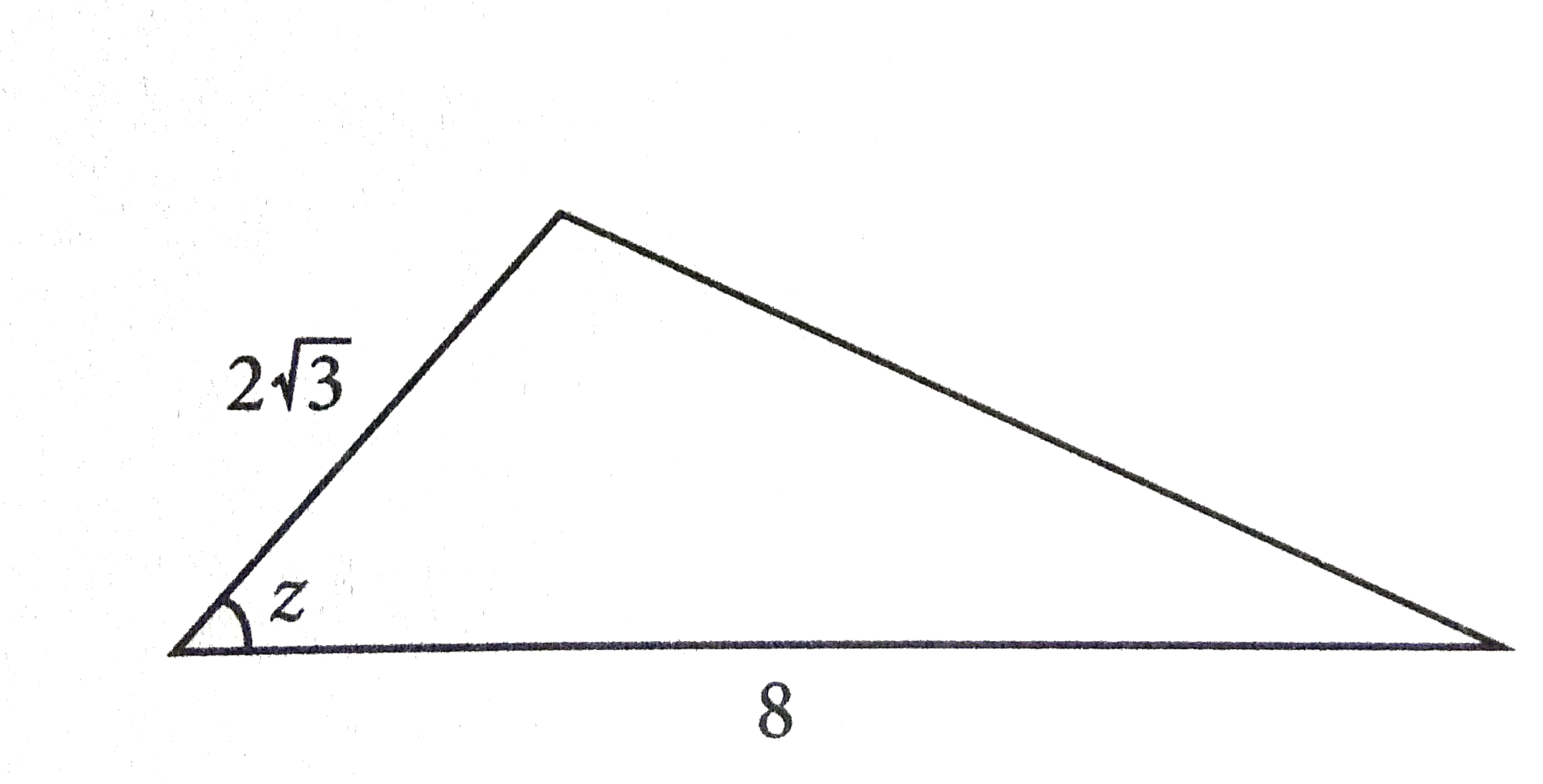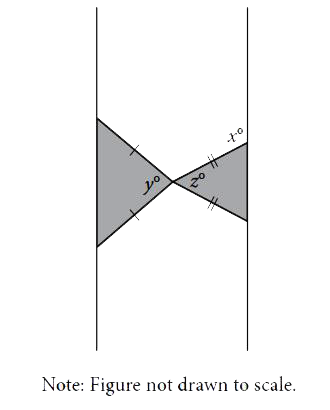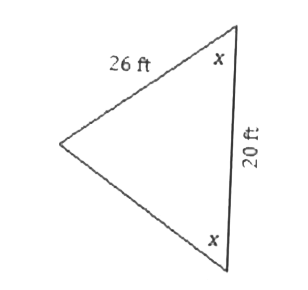
A homeowner drew a sketch of their triangle - shaped garden as shown above. Although the sketch was not drawn accurately to scale, the triangle was labelled with the proper dimensions. What is the value of sinx?
The correct Answer is:≈.923
Step by step video, text & image solution for A homeowner drew a sketch of their triangle - shaped garden as shown above. Although the sketch was not drawn accurately to scale, the triangle was labelled with the proper dimensions. What is the value of sinx? by Maths experts to help you in doubts & scoring excellent marks in Class 12 exams.
Updated on:21/07/2023Similar Questions
Knowledge Check
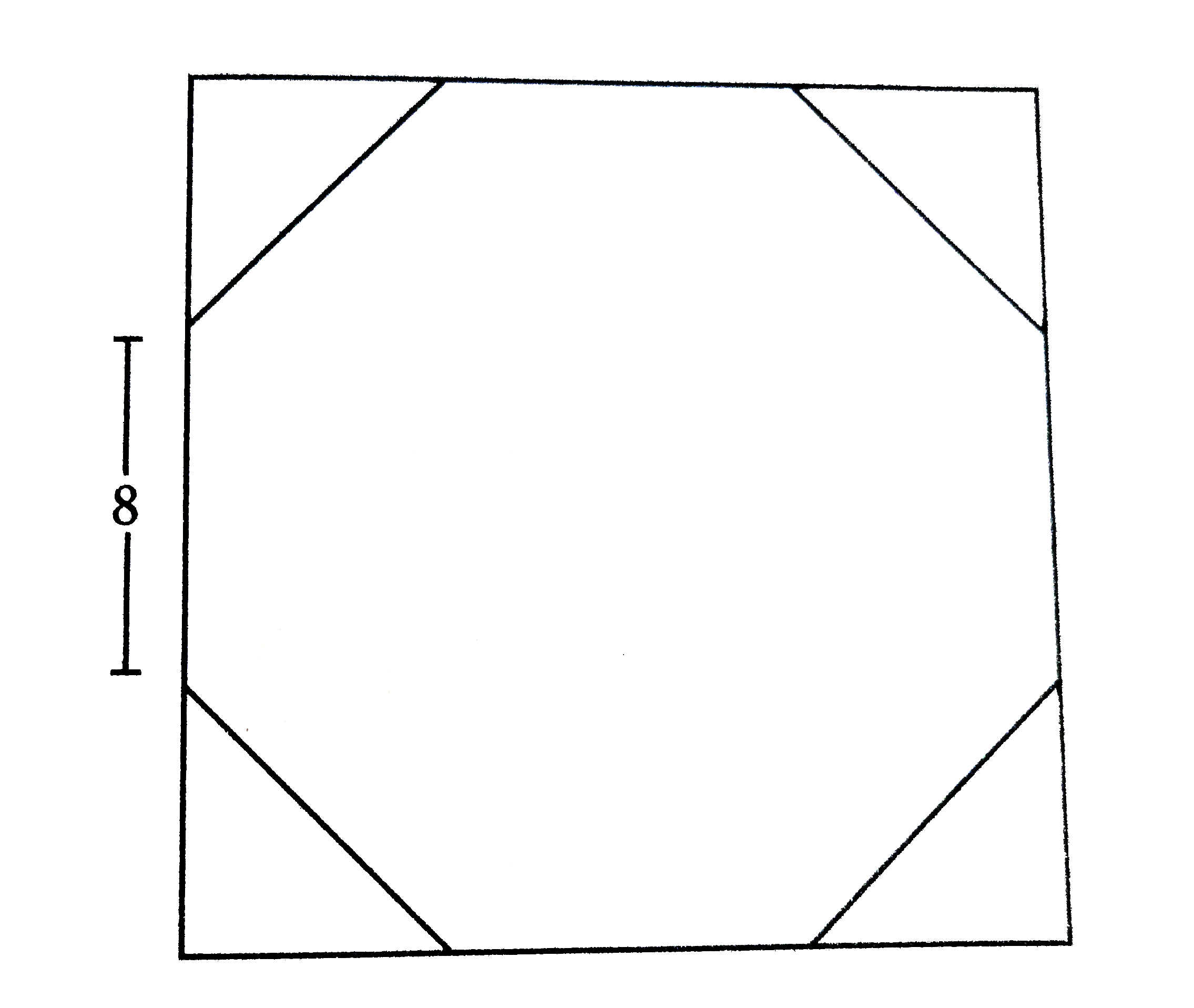
Johan recieves an order for a carpet in the shape of a regular octagon with 8 inche sides. The octangonal carpet will be cut out from a square piece of carpet , as shown in the figure above. What is the area of the one of the 4 congruent triangles that will be cut out from the square?A16B16√2C16√3D64
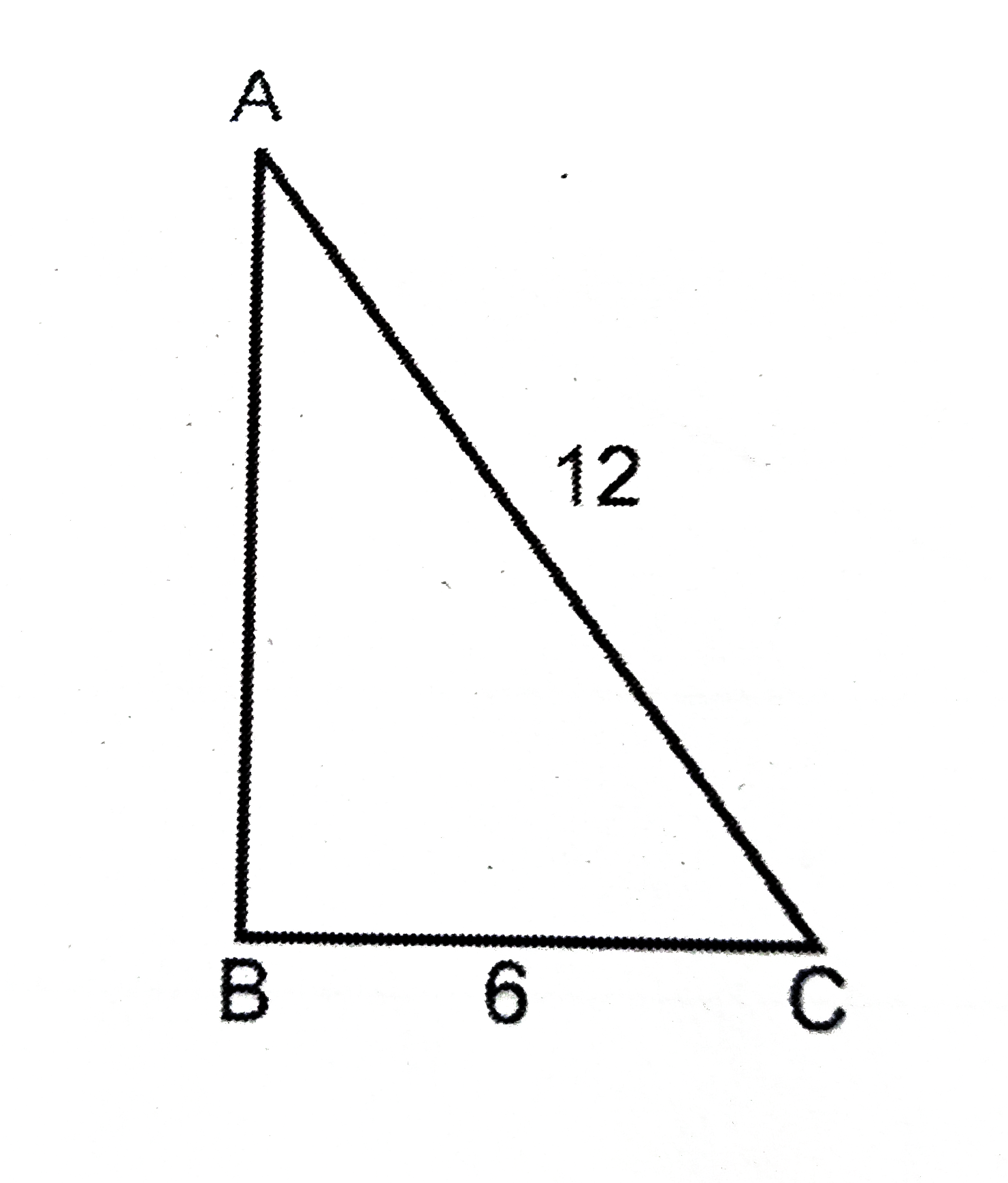
In the figure shown above, ABC is a triangle right angled at B. What is the value of angle A, in degrees?
View Solution
In triangle RST above, point W (not shown) lies on ¯¯¯¯¯¯RT. What is the value of cos(∠RSW)−sin(∠WST) ?
View Solution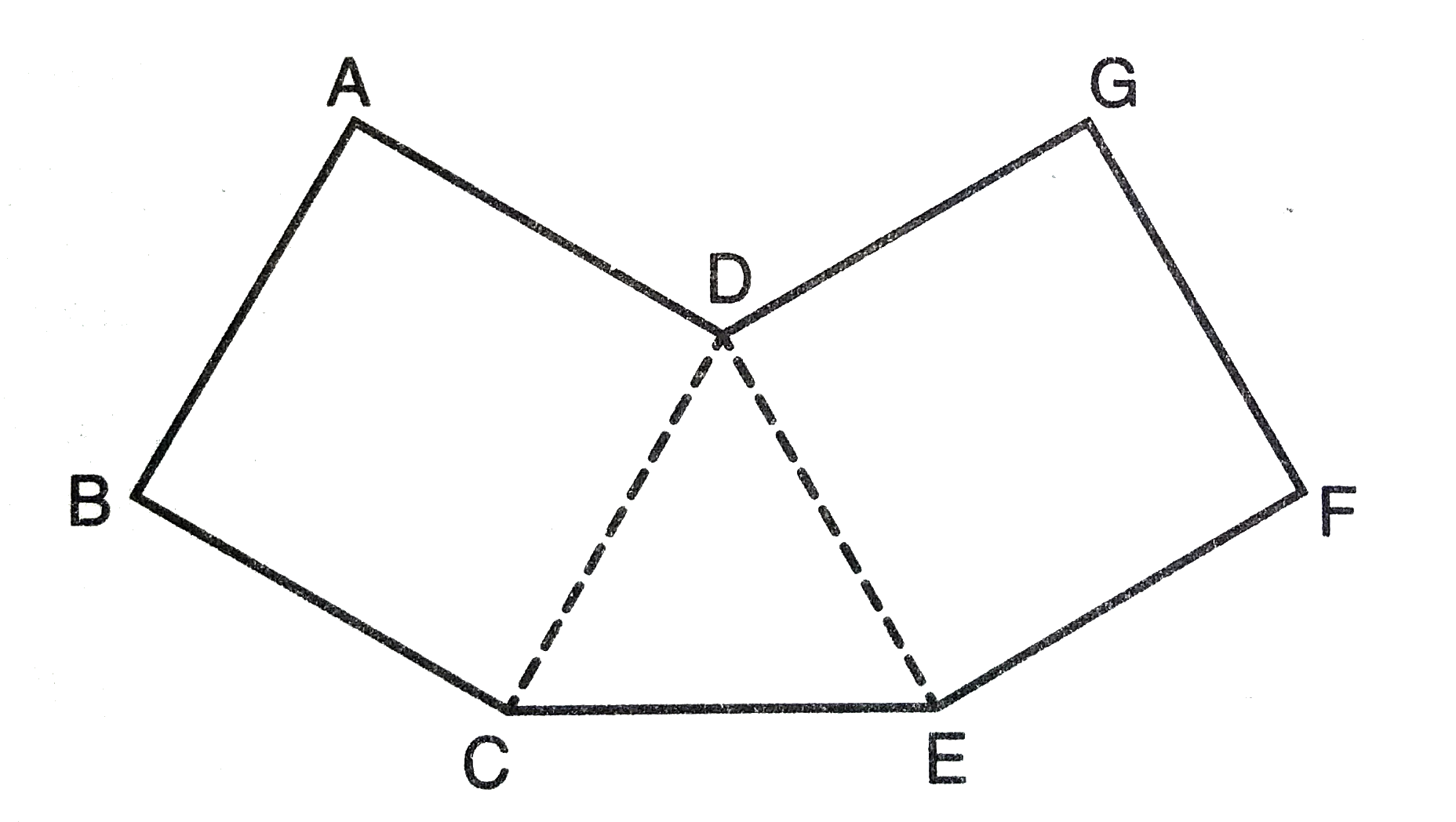
A sterling silver pendant is being designed to have the shape of polygon ABCDEFGD shown above where ABCD and EFGD are squares and triangle CDE is equilateral. If the area of △CDE is 27√3 square centimeter, what is the total linear distance around the pendant?
View SolutionWhen Farmer Oak smiled, the corners of his mouth spread till they were within an unimportant distance of his ears, his eyes were reduced to chinks, and diverging wrinkles appeared round them, extending upon his countenance like the rays in a rudimentary sketch of the rising sun.
His Christian name was Gabriel, and on working days he was a young man of sound judgment, easy motions, proper dress, and general good character. On Sundays he was a man of misty views, rather given to postponing, and hampered by his best clothes and umbrella: upon the whole, one who felt himself to occupy morally that vast middle space of Laodicean neutrality which lay between the Communion people of the parish and the drunken section,- that is, he went to church, but yawned privately by the time the congregation reached the Nicene creed, and thought of what there would be for dinner when he meant to be listening to the sermon. Or, to state his character as it stood in the scale of public opinion, when his friends and critics were in tantrums, he was considered rather a bad man, when they were pleased, he was rather a good man, when they were neither, he was a man whose moral colour was a kind of pepper and salt mixture.
Since he lived six times as many working-days as Sundays, Oak's appearance in his old clothes was most peculiarly his own-the mental picture formed by his neighbours in imagining him being always dressed in that way. He wore a low-crowned felt hat, spread out at the base by tight jamming upon the head for security in high winds, and a coat like Dr. Johnson's, for his lower extremities being encased in ordinary leather leggings and boots emphatically large, affording to each foot a roomy apartment so constructed that any wearer might stand in a river all day long and know nothing of damp-their maker being a conscientious man who endeavoured to compensate for any weakness in his cut by unstinted dimension and solidity.
Mr. Oak carried about him, by way of watch, what may be called a small silver clock, in other words, it was a watch as to shape and intention, and a small clock as to size. This instrument being several years older than Oak's grandfather had the peculiarity of going either too fast or not at all. The smaller of its hands, too, occasionally slipped round on the pivot, and thus, though the minutes were told with precision, nobody could be quite certain of the hour they belonged to. The stopping peculiarity of his watch Oak remedied by thumps and shakes, and he escaped any evil consequences from the other two defects by constant comparisons with and observations of the sun and stars, and by pressing his face close to the glass of his neighbours' windows, till he could discern the hour marked by the green-faced timekeepers within. It may be mentioned that Oak's fob being difficult of access, by reason of its somewhat high situation in the waistband of his trousers (which also lay at a remote height under his waistcoat), the watch was as a necessity pulled out by throwing the body to one side, compressing the mouth and face to a mere mass of ruddy flesh on account of the exertion, and drawing up the watch by its chain, like a bucket from a well.
[From "Far From the Madding Crowd', by Thomas Hardy]
For each word given below choose the correct meaning (as used in the passage) from the options provided:
diverging
View SolutionWhen Farmer Oak smiled, the corners of his mouth spread till they were within an unimportant distance of his ears, his eyes were reduced to chinks, and diverging wrinkles appeared round them, extending upon his countenance like the rays in a rudimentary sketch of the rising sun.
His Christian name was Gabriel, and on working days he was a young man of sound judgment, easy motions, proper dress, and general good character. On Sundays he was a man of misty views, rather given to postponing, and hampered by his best clothes and umbrella: upon the whole, one who felt himself to occupy morally that vast middle space of Laodicean neutrality which lay between the Communion people of the parish and the drunken section,- that is, he went to church, but yawned privately by the time the congregation reached the Nicene creed, and thought of what there would be for dinner when he meant to be listening to the sermon. Or, to state his character as it stood in the scale of public opinion, when his friends and critics were in tantrums, he was considered rather a bad man, when they were pleased, he was rather a good man, when they were neither, he was a man whose moral colour was a kind of pepper and salt mixture.
Since he lived six times as many working-days as Sundays, Oak's appearance in his old clothes was most peculiarly his own-the mental picture formed by his neighbours in imagining him being always dressed in that way. He wore a low-crowned felt hat, spread out at the base by tight jamming upon the head for security in high winds, and a coat like Dr. Johnson's, for his lower extremities being encased in ordinary leather leggings and boots emphatically large, affording to each foot a roomy apartment so constructed that any wearer might stand in a river all day long and know nothing of damp-their maker being a conscientious man who endeavoured to compensate for any weakness in his cut by unstinted dimension and solidity.
Mr. Oak carried about him, by way of watch, what may be called a small silver clock, in other words, it was a watch as to shape and intention, and a small clock as to size. This instrument being several years older than Oak's grandfather had the peculiarity of going either too fast or not at all. The smaller of its hands, too, occasionally slipped round on the pivot, and thus, though the minutes were told with precision, nobody could be quite certain of the hour they belonged to. The stopping peculiarity of his watch Oak remedied by thumps and shakes, and he escaped any evil consequences from the other two defects by constant comparisons with and observations of the sun and stars, and by pressing his face close to the glass of his neighbours' windows, till he could discern the hour marked by the green-faced timekeepers within. It may be mentioned that Oak's fob being difficult of access, by reason of its somewhat high situation in the waistband of his trousers (which also lay at a remote height under his waistcoat), the watch was as a necessity pulled out by throwing the body to one side, compressing the mouth and face to a mere mass of ruddy flesh on account of the exertion, and drawing up the watch by its chain, like a bucket from a well.
[From "Far From the Madding Crowd', by Thomas Hardy]
For each word given below choose the correct meaning (as used in the passage) from the options provided:
postponing
View SolutionWhen Farmer Oak smiled, the corners of his mouth spread till they were within an unimportant distance of his ears, his eyes were reduced to chinks, and diverging wrinkles appeared round them, extending upon his countenance like the rays in a rudimentary sketch of the rising sun.
His Christian name was Gabriel, and on working days he was a young man of sound judgment, easy motions, proper dress, and general good character. On Sundays he was a man of misty views, rather given to postponing, and hampered by his best clothes and umbrella: upon the whole, one who felt himself to occupy morally that vast middle space of Laodicean neutrality which lay between the Communion people of the parish and the drunken section,- that is, he went to church, but yawned privately by the time the congregation reached the Nicene creed, and thought of what there would be for dinner when he meant to be listening to the sermon. Or, to state his character as it stood in the scale of public opinion, when his friends and critics were in tantrums, he was considered rather a bad man, when they were pleased, he was rather a good man, when they were neither, he was a man whose moral colour was a kind of pepper and salt mixture.
Since he lived six times as many working-days as Sundays, Oak's appearance in his old clothes was most peculiarly his own-the mental picture formed by his neighbours in imagining him being always dressed in that way. He wore a low-crowned felt hat, spread out at the base by tight jamming upon the head for security in high winds, and a coat like Dr. Johnson's, for his lower extremities being encased in ordinary leather leggings and boots emphatically large, affording to each foot a roomy apartment so constructed that any wearer might stand in a river all day long and know nothing of damp-their maker being a conscientious man who endeavoured to compensate for any weakness in his cut by unstinted dimension and solidity.
Mr. Oak carried about him, by way of watch, what may be called a small silver clock, in other words, it was a watch as to shape and intention, and a small clock as to size. This instrument being several years older than Oak's grandfather had the peculiarity of going either too fast or not at all. The smaller of its hands, too, occasionally slipped round on the pivot, and thus, though the minutes were told with precision, nobody could be quite certain of the hour they belonged to. The stopping peculiarity of his watch Oak remedied by thumps and shakes, and he escaped any evil consequences from the other two defects by constant comparisons with and observations of the sun and stars, and by pressing his face close to the glass of his neighbours' windows, till he could discern the hour marked by the green-faced timekeepers within. It may be mentioned that Oak's fob being difficult of access, by reason of its somewhat high situation in the waistband of his trousers (which also lay at a remote height under his waistcoat), the watch was as a necessity pulled out by throwing the body to one side, compressing the mouth and face to a mere mass of ruddy flesh on account of the exertion, and drawing up the watch by its chain, like a bucket from a well.
[From "Far From the Madding Crowd', by Thomas Hardy]
For each word given below choose the correct meaning (as used in the passage) from the options provided:
compensate
View Solution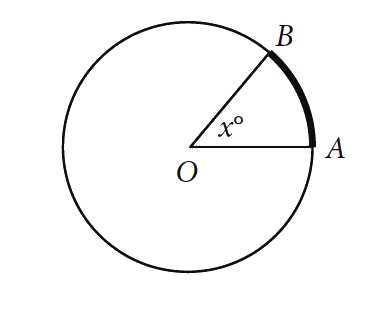
Note: Figure not drawn to scale.
In the figure above, the circle has center O and has radius 10. If the length of arc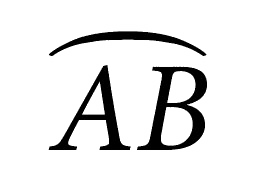 (shown in bold) is between 5 and 6, what is one possible integer–––––––– value of x ?
(shown in bold) is between 5 and 6, what is one possible integer–––––––– value of x ?
View Solution

